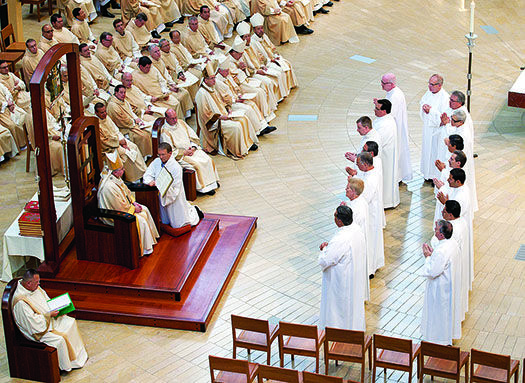Ramon Nu√±ez’ father told him, “If you don’t serve, you don’t know what you were born for.” He also put these words into practice. “When I was little, all I ever saw was my parents always serving somebody — in the home, in the church and at school. Always serving,” Nu√±ez said.
“I always looked for ways to serve,” said Nu√±ez. “I was motivated by the role models around me, the priests that I have worked with and the deacons that I know.”
Nu√±ez and 18 other men have completed a five-year journey through the Archdiocese of Los Angeles’ diaconate formation program and are to be ordained by Archbishop José H. Gomez on June 6 as part of the Blessed John Henry Newman Formation Class of 2015 at the Cathedral of Our Lady of the Angels.
Ten of the 19 men who will be ordained to the permanent diaconate are from the Spanish-language-side of the program.
“The permanent deacons often work in the real world alongside ‘real people,’ holding regular jobs and do a variety of things across all occupations,” said Deacon David Estrada, director of diaconate formation for the Archdiocese of Los Angeles.
“Most, but not all, permanent deacons are married. They bring the perspective of family into ordained ministry. We have ordained men who are also family men who can provide that insight and expertise in service to the faithful,” Estrada continued.
Omar Uriate is one of them.
“When I was an altar server, I saw the deacon assisting the priest at Mass and I told myself, ‘I want to do that someday,’” he said. “I was discerning to be a deacon for over 24 years. I put it to prayer, pushed it aside, but the call always seemed to resurface. It’s something you can’t just shake off.”
A deacon officiated Omar’s wedding to Sheila as a symbol that the two, “God willing,” would become a deacon couple. He applied two years later, but put it aside, he said.
“For me, it was a long haul,” said Omar describing this 10-year period.
Ramon Nuñez submitted his application at age 44 and heard nothing.
“God always has a plan,” Nu√±ez recalled. “The morning of my birthday, exactly 10 years after I applied, I told my wife ‘If they don’t call me this year I won’t go because I am getting old and I don’t want to be a very old deacon.’ That very evening I got a call asking if I was still interested in going through the program.”
Deacon Estrada said the archdiocese is looking for men who have the right disposition, gifts and talent to serve through ordained ministry.
“Deacons are able to penetrate not only family and work life of lay people, but also the clerical life, bridging both. We have the ability to evangelize and bring the message of the Gospel out into the real world in various ways that were not available to the modern Church prior to the restoration of the diaconate,” Deacon Estrada said.
The deacons minister under the pillars of the Word, liturgy and service, he said. And wives of married permanent deacons play crucial role in their formation and service.
“Wives participate completely in the first year of formation, which is heavily spiritual. We want the couple to grow together as they begin the formation,” Estrada said.
In the second year the wives are encouraged to attend all sessions but it is not a requirement. Many wives who choose to participate through the entire program, never missing a session.
“This journey has overwhelmingly strengthened our marriage. The sacrament of marriage becomes so real and vivid. Seeing a deacon couple facilitating our class, another journeying with us every year, others teaching us lessons in spiritual direction, and our past and present director of formation along with their wives leading us, it’s just amazing,” Uriate said.
He said the deacon and his wife are a “beautiful, vivid, tangible sign of the sacrament of marriage.” His wife agreed.
“It’s an exciting time in our lives. It’s going to be a transition. He no longer is just a husband and a father, he is now ordained, so he takes on a different role. There will be a new path put in front of us that we get to journey together,” said Sheila Uriate.
In the words of Deacon Estrada, “Deacons wash feet.” Uriate is ready.
“A deacon is always open to the will of the Spirit,” said Uriate. “If you look at service as a chore, this is not the life for you. When you look at service as your response to loving Jesus Christ, your act of love back to the Lord, then that’s when you know you are being called to be a deacon.”

